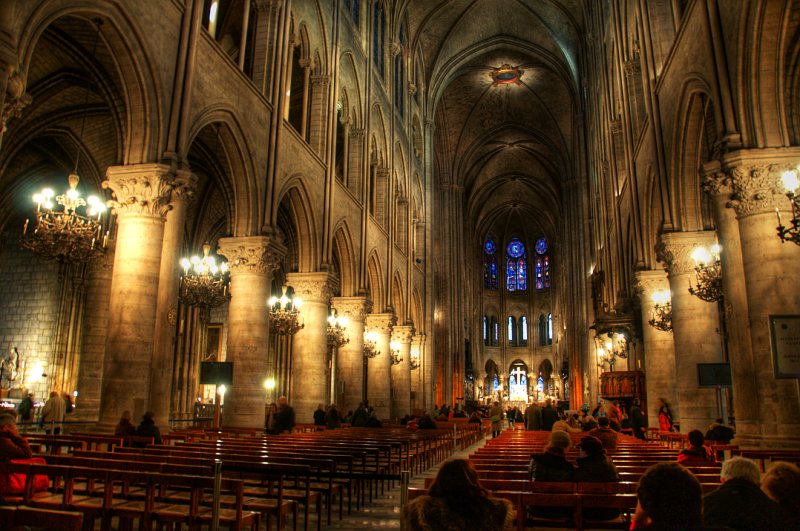 The summer of my seventh grade,
our family went to France for vacation. The tour bus dumped us in front of the
Notre Dame, where flocks of tourists crowded the famous site. Shouting over the
multilingual clamor of voices and ducking out of camera frames, my family and I
weaved our way into the ancient church. The moment we walked– or rather, were
shoved – through the heavy church doors, we were welcomed with a gust of cool
dusty air and a peaceful silence. The altar of the church and the familiar crucifix
stood in front of me, with a congregation of people
gathered in the pews. As strains of the words Alleluia, alleluia reached our ears and a priest in his vestments approached the ambo, it dawned upon us that we had stumbled into a Mass that was being celebrated inside the
Notre Dame. We weren’t expecting for this to happen – after all, going to Mass
wasn’t part of the itinerary the tour guide gave us. While tourists around us
snapped pictures of the church, my family and I jumped in the communion line
and received the Holy Eucharist from a French lady. “The body of Christ,” she
said in her language with smiling eyes. Thank goodness “Amen” is the same response
in all countries.
The summer of my seventh grade,
our family went to France for vacation. The tour bus dumped us in front of the
Notre Dame, where flocks of tourists crowded the famous site. Shouting over the
multilingual clamor of voices and ducking out of camera frames, my family and I
weaved our way into the ancient church. The moment we walked– or rather, were
shoved – through the heavy church doors, we were welcomed with a gust of cool
dusty air and a peaceful silence. The altar of the church and the familiar crucifix
stood in front of me, with a congregation of people
gathered in the pews. As strains of the words Alleluia, alleluia reached our ears and a priest in his vestments approached the ambo, it dawned upon us that we had stumbled into a Mass that was being celebrated inside the
Notre Dame. We weren’t expecting for this to happen – after all, going to Mass
wasn’t part of the itinerary the tour guide gave us. While tourists around us
snapped pictures of the church, my family and I jumped in the communion line
and received the Holy Eucharist from a French lady. “The body of Christ,” she
said in her language with smiling eyes. Thank goodness “Amen” is the same response
in all countries.  When I studied
abroad for seven months in Asia, I went to Mass in Beijing, Taipei, and Hong
Kong. On most occasions, I couldn’t understand everything that was said. But finding
a Catholic Church was how I felt at home when I didn’t even feel at home with
myself. It wasn’t just the building, but the family which it contained. It was like
coming back from college and smelling the delicious home cooked meal waiting
for you. Or finding legit Mexican food in Asia (let me tell you how exciting
that was!). Or reuniting with a long-lost friend. The first time I went to Mass
in Beijing, this kind elderly woman grabbed me by the hand and enthusiastically
gave me resources to find Catholic churches near me. She even took down my
contact information, scribbling down “Foreigner (老外)” as a note.
When I studied
abroad for seven months in Asia, I went to Mass in Beijing, Taipei, and Hong
Kong. On most occasions, I couldn’t understand everything that was said. But finding
a Catholic Church was how I felt at home when I didn’t even feel at home with
myself. It wasn’t just the building, but the family which it contained. It was like
coming back from college and smelling the delicious home cooked meal waiting
for you. Or finding legit Mexican food in Asia (let me tell you how exciting
that was!). Or reuniting with a long-lost friend. The first time I went to Mass
in Beijing, this kind elderly woman grabbed me by the hand and enthusiastically
gave me resources to find Catholic churches near me. She even took down my
contact information, scribbling down “Foreigner (老外)” as a note. This is the beauty of a universal church. Where there is a Catholic church, there is a home. Where there is Mass, there is a community. Not only are Catholics connected with other fellow faithful around the world, but our modern experiences today also intertwine with the long history of saints, traditions, scripture, and teachings which came before us. Pope Benedict XVI’s shares in his last General Audience, "Here, one can touch what the Church is -- not an organization, not an association for religious or humanitarian purposes, but a living body, a community of brothers and sisters in the Body of Jesus Christ, who unites us all."
Like any other institution involving humans, the Catholic Church isn’t perfect. Regrettably, there have been mistakes and failures to extend loving arms to every person. But still, the Catholic Church is a home for the sinners, a hospital for the broken, and an academia for the seeking. It isn’t about speaking the same language or coming from the same town. It’s about the faith, hope, and love. We can sing, dance, and celebrate our cultural diversity because what brings us together is not anything that belongs to this world, but to the Heavenly one.





